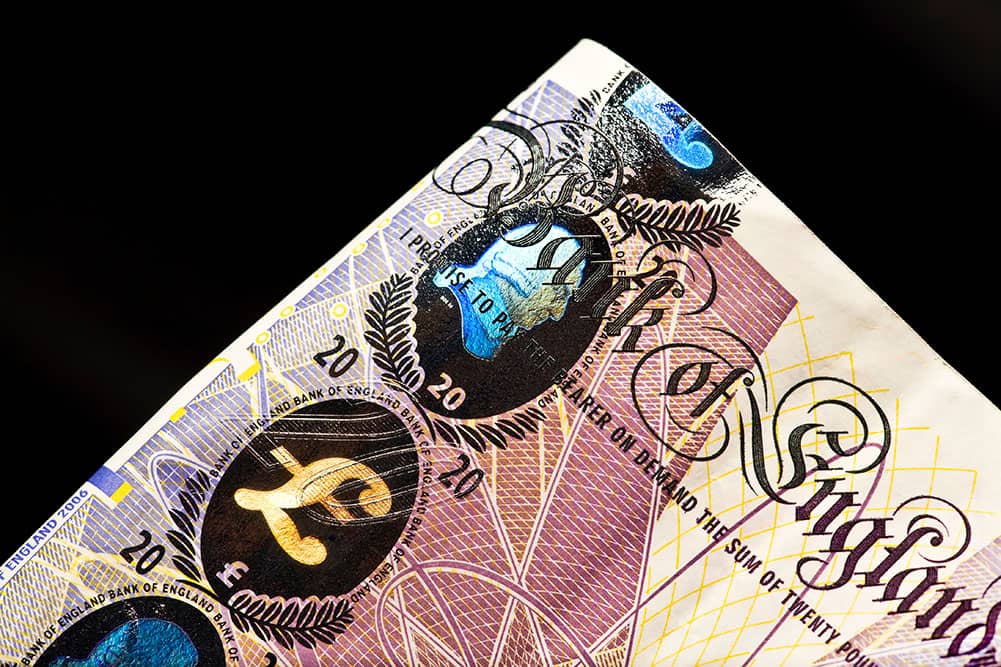GBP/USD Week Ahead Forecast: Door Opened to Further Losses
- Written by: Gary Howes
- Deeper move into 1.24s possible
- UK wage data is key UK event
- Broader USD trend remains positive
- Watch U.S. inflation releases midweek

Image © Bank of England
The Pound to Dollar exchange rate is said by analysts we follow to be at risk of further losses in the short-term and even a positive UK labour market report on Tuesday would unlikely be enough to resist the broader Dollar trend.
The exchange rate fell below 1.25 in the previous week and analysts suggest this underscores a deterioration in the technical setup that leaves the charts advocating for further near-term losses.
"A test of the $1.25 level for GBP/USD was brewing and the key psychological level did indeed give way. The 200-day support, located at $1.2425, could be the next short-term target as questions about the UK interest rate trajectory weigh on sterling," says George Vessey, FX and Macro Strategist at Convera.
Pound Sterling was the worst performing of the major currencies in the midweek session after some frank comments from the Bank of England's Governor Andrew Bailey that the UK's interest rate hiking cycle was close at hand.
The admission prompted markets to lower expectations for a November interest rate hike, while also increasing the odds that it could even leave rates unchanged in September.
Pound-Dollar last week fell to a fresh three-month low at 1.2454 after investors were left with very few attractive alternatives to the Dollar in the wake of underwhelming Chinese and Eurozone economic data.
GBP to USD Transfer Savings Calculator
How much are you sending from pounds to dollars?
Your potential USD savings on this GBP transfer:
$1,702
By using specialist providers vs high street banks
Disappointing data in Europe, the UK and China contrasts with a better-than-expected run of U.S. data that raises expectations that the U.S. Federal Reserve can maintain interest rates at current levels for an extended period.
The rise in oil prices is meanwhile tipped by analysts to be supportive of the U.S. Dollar as non-oil exporting countries are expected to see inflation rates remain elevated as growth continues to slow.
Such stagflationary conditions are however unlikely to be experienced by the U.S. where growth continues to outperform expectations relative to China and Europe in what amounts to a reboot of the 'U.S. exceptionalism' trade.
Wells Fargo - a major U.S. bank - said in its most recent monthly research note the dollar can exhibit more strength through to to end of 2023 than had been previously expected.
"Our view on the U.S. dollar has changed slightly. We now believe the dollar can exhibit more strength through the end of 2023 than previously expected as China's slowdown and a resilient U.S. economy can support the greenback," says Nick Bennenbroek, an economist at Wells Fargo.
Above: The Dollar index, a broad measure of USD performance, is in a firm uptrend. Image courtesy of City Index.
Pound Sterling's trade against the Dollar will likely see some UK-induced volatility on Tuesday when the ONS releases its latest jobs and wage figures.
The market expects the average earnings + bonus to read at 8.2%, a figure that is ultimately consistent with high inflationary levels in the UK and which the Bank of England would like to see come lower.
The Bank signalled last week it was close to ending its interest rate hiking cycle, a message that would be afforded some credibility were the headline wage numbers to undershoot expectations.
The Pound fell in the wake of Bank of England Governor Andrew Bailey's message to UK lawmakers last Wednesday that the top in rates was close because the Bank expected inflation to fall sharply over the coming months.
The Pound would therefore likely fall again if the data supported his message. "Sterling is also likely to remain sluggish following the dovish remarks that BoE Governor Bailey and other MPC members made before the UK Treasury Select Committee, hinting that UK policy rates are near the top of the cycle," says Roberto Mialich, FX Strategist at UniCredit Bank.
GBP to USD Transfer Savings Calculator
How much are you sending from pounds to dollars?
Your potential USD savings on this GBP transfer:
$1,702
By using specialist providers vs high street banks
A report from Oxford Economics last week warned their bespoke modelling pointed to an upside surprise in the data, which would put us on alert for a potential bounce in the Pound on any strong readings.
Yet, Friday's REC report revealed the UK's labour market was loosening as employer demand for employees fell at the fastest rate since 2020 in August. At the same time, the number of job seekers had risen, leading to lower wage offers.
https://www.poundsterlinglive.com/economics/19212-bank-of-england-pausers-will-welcome-fresh-evidence-labour-demand-is-slumping
"We expect the jobs report to show some loosening in conditions with a rise in the unemployment rate to 4.3%," says Philip Shaw, Economist at Investec.
The market consensus also looks for the ONS to report the unemployment rate rose to 4.3% in July from 4.2% in June.

Image © Adobe Stock
In the U.S. this week all eyes are on the release of inflation data for August on Wednesday at 13:30 BST.
Core CPI is expected to rise 0.2% in the month to August with the headline figure expected at 0.5% m/m.
Should the figures beat expectations the Dollar would likely find further support as markets price in U.S. interest rates staying at elevated levels for a longer period.
Thursday sees the release of PPI inflation numbers, with the headline expected to come in at 0.4% m/m for August.
"It is a very big week for US data as the last major reports ahead of the Federal Reserve's September FOMC meeting come in," says James Knightley, Chief International Economist at ING Bank.
For inflation, ING looks for fairly big jumps in August's month-on-month headline readings with upside risk relative to consensus predictions.
"Higher gasoline prices will be the main upside driver, but we also see the threat of a rebound in airfares and medical care costs, plus higher insurance prices," says Knightley
U.S. retail sales are due Thursday at 13:30 BST and the market looks for a reading of 0.2% growth, down from July's 0.7% increase. Industrial production is due out Friday at 14:15 BST and the figure to beat is 0.1%.
GBP to USD Transfer Savings Calculator
How much are you sending from pounds to dollars?
Your potential USD savings on this GBP transfer:
$1,702
By using specialist providers vs high street banks






